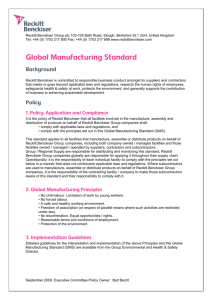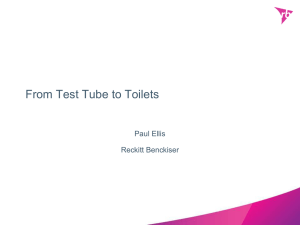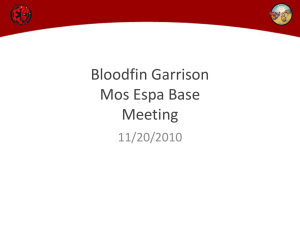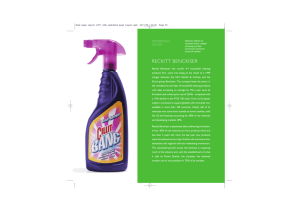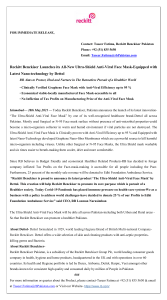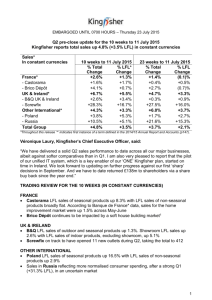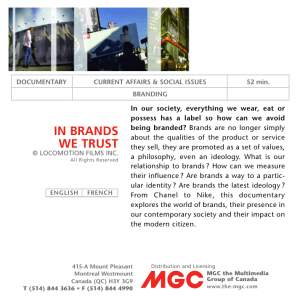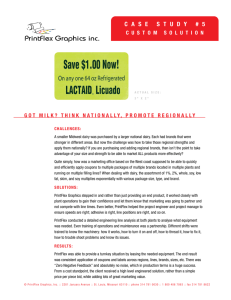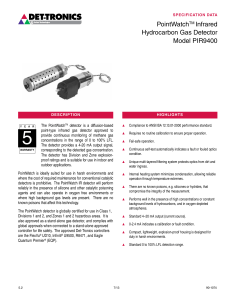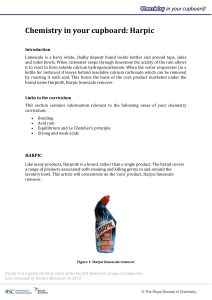Finance and Accounting
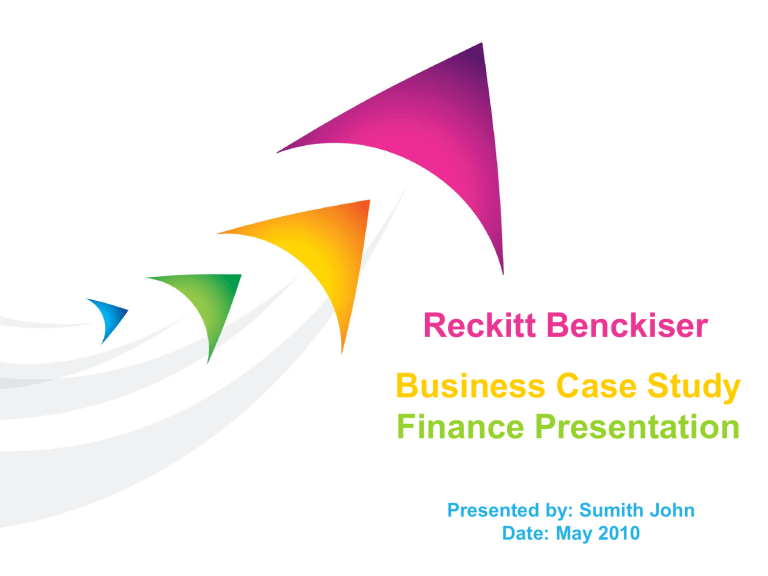
Reckitt Benckiser
Business Case Study
Finance Presentation
Presented by: Sumith John
Date: May 2010
5.0
4.0
3.0
2.0
1.0
0.0
8.0
7.0
6.0
Ten straight years of double the industry average Net Revenue growth
More than doubling the size of RB
Net revenue (£bn)
Per annum growth: +9% @ constant
Per annum LFL growth: +8% @ constant
3.0
3.1
3.4
3.5
3.7
3.9
4.1
4.9
1999
5.3
6.6
7.8
2009
2004 restated following the adoption of IFRS
2
Ten straight years of double the industry average Net Income growth
7-fold increase in RB’s net income
1,600
1,400
1,200
1,000
800
600
400
200
0
Adj. net income* (£m)
Per annum growth: +22% @ actual
Per annum growth: +19% @ constant
200 275
340
408
489
577
669
1999
786
905
1,143
1,418
2009
* Adjusted to exclude the impact of exceptional items
3
How do we achieve such outstanding results…
Reckitt Benckiser is about passionately delivering better solutions in Household,
Health and Personal care to customers and consumers, wherever they may be, for the ultimate purpose of creating shareholder value.
What is our portfolio…
Finance Charter
“The purpose of finance is to be a business partner that adds value to the organization”
1. Provide accurate and timely information
2. Challenge to enable better business decisions
3.
Manage procedures that safeguard company’s assets
4. Maintain low cost transactional services
Reckitt Benckiser – Business Case Study
• Business Overview
• Annual Report and Financial Statements
• Comparison Ratios
• ANZ Finance Team
• Questions
Business Overview
Business Overview – Geographic Areas
UK listed. Top 25 of FTSE 100
Market Cap £ 24 bn
Reckitt Benckiser is a truly global company:
- Operations in 60+ countries
- Sales in c. 180 countries world-wide
- 49 Manufacturing facilities world-wide
- c.22,000 employees
Business Overview – When you meet us…
• RB people are at the heart of the company's success.
• We come from all over the world and work all over the world
• We thrive on responsibility, take ownership, are straight speaking and have an intense drive for progress and action.
• We act fast and are compelled to outperform wherever we focus, even in corporate responsibility, where Reckitt Benckiser has the most ambitious carbon reduction programme in the industry.
• We bring together entrepreneurial people who want to make their mark and consumer products history.
• We execute our strategy by being brave, focused and driven.
Always going further, faster and higher.
Business Overview – What Brands…
• 17 Powerbrands lead our portfolio of household, health and personal care products, and they have the No.1 or No. 2 position globally in most categories - a unique position.
• Known, trusted and sought out, RB's brands are not just famous names, they are part of people's lives.
• The 17 Powerbrands are Vanish, Calgon, Woolite, Lysol,
Bang, Harpic, Finish, Air Wick, Mortein, Strepsils, Mucinex,
Nurofen, Gaviscon, Dettol, Veet, Clearasil, French's
Business Overview – Five Core Categories
• Fabric Care
• Surface & Dish
• Home Care
• Health Care
• Germ & Personal
Care
Business Overview – Market Position
WORLD No.1
Category
Surface Care
Germ Protection
Fabric Treatment
Depilatories
Automatic Dishwashing
Sore Throat (medicated)
Water Softeners
Lavatory Care
Brand
Cillit Bang, Lysol
Dettol, Lysol
Vanish
Veet
Finish/Calgonit
Strepsils
Calgon
Harpic/Lysol
WORLD No.2
Category
Air Care
Pest Control
Garment Care
Brand
Airwick
Mortein
Woolite
REGIONAL No.1/No.2
Category Brand
Analgesics
Cold/Flu
Upper GI
Nurofen (Europe)
Lemsip (UK)
Gaviscon (Europe)
Business Overview – Market Position
World champions
17 Power Brands are either
No.1 or No.2 worldwide
With Powerbrands as the clear growth driver
Old basis
(18 Powerbrands)
New basis
(17 Powerbrands*)
80
70
60
50
40
30
20
10
0
40
46
51
53
57
58
61
62
70 70
2001 2002 2003 2004 2005 2006 2007 2008 2008 2009
* Includes brands in transition
• Powerbrands have grown
>12% pa compared to 7% pa for RB excluding RBP
• Powerbrands have represented 84% of RB’s growth over the period
2001-2009
15
Creating a great portfolio of brands
Net revenues (£m) & net revenue growth % in 2009
800
700
600
500
400
300
200
100
0
^6% ^4% ^6%^28%^10%^17%^10%^17%^10%^4% ^2% -4% ^2% ^6% ^10% ^6% ^-4%
Global Jewels 44% % base business NR
Global Jewels + HC 57% % base business NR
Total PB 75% % base business NR
Mucinex growth 08-09 LFL
16
All internal areas have contributed to growth
Net revenue growth 1999-2009, at constant
CAGR: +7%
LFL: +6%
CAGR: +9%
LFL: +7%
CAGR: +13%
LFL: +13%
CAGR: +36%
LFL: +36%
17
The power behind the Powerbrands
18
Business Overview - Summary
• Geographical segments:
− Europe
− North America / Australia & New Zealand
− Developing Markets
• Category segments:
− Fabric Care
− Surface & Dish
− Home Care
− Health Care
− Germ & Personal Care
• 17 Power Brands
− Increasingly the focus of the business
− Makes up +75% of company net revenue
Annual Report and Financial Statements
Annual Report and Financial Statements 2009
Annual Report and Financial Statements 2009
Financial Statements
Reports available online
Annual Report and
Shareholders’ Review available at: http://www.rb.com
Investor Information
Financial Statements – Group Income Statement for the year ended 31 December 2009
Profit & Loss Statement
Net Revenue less: Cost of Goods Sold
= Gross Margin less: Marketing expense and commercial overheads
= Operating Profit less: Interest and Tax
= Profit for the year
Financial Statements – Group Balance
Sheet as at 31 December 2007 Balance Sheet
Non-current assets plus: Current Assets
= Total Assets
Current Liabilities plus: Non-Current Liabilities
= Total Liabilities
Total Assets less: Total Liabilities
= Net assets
= Total equity
Total equity £ 4 billion
Market Cap £ 24 billion
Internally generated goodwill
£ 20 billion
Financial Statements – Group Cash Flow Statement for the year ended 31 December 2007
Cash Flow Statement
Net cash flows from operating activities plus: Investing activities plus: Financing activities
= Net cash flow for the year
Financial Statements – Independent Audit Report
In our (‘PwC’) opinion… the Group financial statements give a true and fair view , in accordance with IFRS…
Annual Report and Financial Statements - Summary
• Income Statement (Profit & Loss):
− records the Company’s financial performance between two points in time
• Balance Sheet:
− captures the Company’s financial position at a single point in time
− difference between market capitalisation and balance sheet equity is internally generated goodwill
• Cash Flow Statement
− operating activities
− investing activities
− financing activities
• Independent Audit Report
− independent third party opinion about the Company’s Financial Statements
Comparison Ratios
Comparison Ratios
Why use ratios?
• Understand business trends over time;
• Used to measure business performance;
• Understand and detect where problems may exist;
• Devise means to fix the problems;
• Drive accountability; and
• Benchmark against competitors.
Key Performance Indicators (KPI)
A good year in tough conditions
Leading to 10th straight year of above industry average growth
Consistent gross margin progression
Full year margins 2005-2009 (%)
Consistent operating margin progression
Full year margins 2005-2009 (%)
Total Dividends paid
£m
Comparison Ratios - Summary
• Key Performance Indicators
− Net Revenue growth
− Gross Margin %
− Operating Margin %
− Net Working Capital Ratio
− Total Dividends paid
ANZ Finance Team
ANZ Finance Team
Finance Director ANZ
Ian Clark
Financial Controller
Peter Bryden
Financial Accountant
Greg Montgomery
Financial Accountant
Joel Lieschke
Assistant Financial Accountant
Tammy Nguyen
Accounts Payable /
Rec Supervisor
Corrine Parsons
Accounts Clerk
Melissa Stone
Accounts Clerk
Sushil Napier
Accounts Clerk
Kim Abbott
Accounts Clerk Part-time
Ivana Anstey
Payroll & Remunerations
Manager
Wayne Farlow
Payroll Officer – Part-time
Ivana Anstey
Supply Controller
Michael Biernat
Supply Chain Analysis
Manager
Karen Duong
Supply Business Analyst
Ahmed Hassan
Supply Business Analyst
Robert Tuwera
• Prepare Monthly Results
• Submit to CHQ
• Maintain General Ledger
• Maintain Fixed Assets Ledger
• Review & file Tax
• Manage Insurance
• Reconcile Bank Accounts
• Liaison with HO Treasury
• Prepare & report to Audit
Commercial Controller
Todd Shelly
Finance Director
– NZ
Kirstin Hayes
Commercial Analysis Manager
Sumith John
Commercial Business Analyst
Zankar Pandya
Commercial Analysis Manager
Alan Rogers
Commercial Business Analyst
Michael Ching
Commercial Analyst
Heidi Johnson (Mat Leave)
Patti Schefter
• Planning & forecasting
• Pricing review & analysis
• Review Marketing spend
• Review Marketing ROI
• Category finance review
• Develop new product project review & analysis
• Prepare Factory Budgets
• Prepare Supply Forecasts
• Monthly Factory Reporting
• COGS Information for NPD
• Standard Cost Maintenance
• Inventory Management
